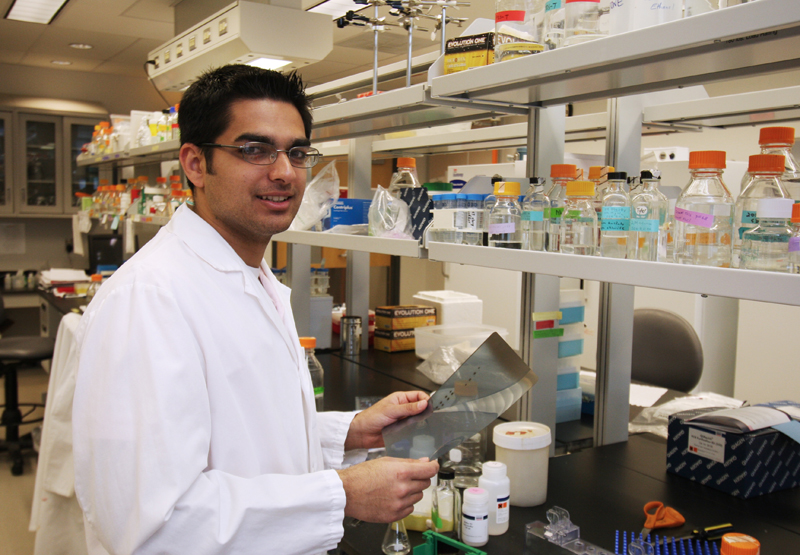Graduate student awarded National Science Foundation fellowship

The National Science Foundation (NSF) has awarded a prestigious Graduate Research Fellowship to a Virginia Tech Ph.D. student enrolled in the university's genetics, bioinformatics and computational biology program.
Shiv Dutt Kale, of Fairfax, Va., also completed his undergraduate work at Virginia Tech, graduating magna cum laude with Bachelor of Science degrees in biochemistry and biology, a minor in chemistry, and an option in biotechnology.
Kale began working as an undergraduate laboratory assistant in Virginia Bioinformatics Institute Professor Brett Tyler’s lab in the summer of 2006, where he worked on Phytophthora-soybean interaction projects, and invented a new gene delivery device that has since been patented.
Kale is one of only 950 awards made nationwide, and the first NSF Graduate Research Fellow for the Virginia Tech genetics, bioinformatics and computational biology program. Kale joined the program in 2007, and continues to work with Tyler, who serves as his advisor. They are currently studying the mechanism for the entry of disease-related effector molecules into host cells, for example protein molecules produced by plant pathogens like Phytophthora.
A scientific poster by Kale, describing this work, recently won a Genetics Society of America poster award at the 25th Fungal Genetics Conference in Pacific Grove, Calif., in March of 2009. The award was given to the top ten posters, out of more than 600 entries, representing work from universities on four continents. Kale plans on using his NSF award to continue working on eukaryotic pathogen-host interactions and to collaborate with Erin Dolan, assistant professor in the Department of Biochemistry at Virginia Tech, to develop a modular class component for high school students with a focus on pathogen-host interactions.
Kale said, “I have been extremely fortunate to work with a very talented team of collaborators within and beyond Dr. Tyler’s laboratory. Dr. Daniel Capelluto in the Department of Biological Sciences at Virginia Tech has been instrumental in helping to determine the structure of the disease-related effector molecules involved in the entry of pathogen proteins into host cells. Dr. Erin Dolan helped me to design the outreach component of my NSF fellowship. They have all been a huge inspiration for me to pursue a career path in science.”
The NSF Graduate Research Fellowship provides three years of support for graduate study leading to research-based master’s or doctoral degrees and is intended for students who are at the early stages of their graduate career. The purpose of the award is to maintain and build a diverse group of researchers and educators across the United States in the science, technology, engineering, and mathematics disciplines relevant to the mission of NSF.
Genetics, bioinformatics and computational biology program students at Virginia Tech work closely with researchers on cutting-edge science projects, helping to find relevant solutions to critical problems in the life sciences. Developed in partnership with the Virginia Bioinformatics Institute, the program encompasses molecular biology, genomics, mathematics, statistics, and computer science and promotes transdisciplinary approaches in all areas of the life sciences. Tailored individually to students’ background and needs, the program spans traditional departmental boundaries and allows students enrolled in a program to work with faculty from multiple departments and colleges.




